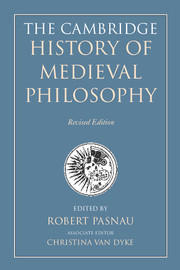Book contents
- Frontmatter
- Contents of Volume 1
- Preface
- List of contributors
- Frontmatter
- Contents of Volume 2
- Introduction
- I Fundamentals
- II Logic and language
- III Natural philosophy
- 16 Natural philosophy in earlier latin thought
- 17 Creation and causation
- 18 The influence of arabic aristotelianism on scholastic natural philosophy: projectile motion, the place of the universe, and elemental composition
- 19 Change, time, and place
- 20 The nature of change
- IV Soul and knowledge
- V Will and desire
- VI Ethics
- VII Political philosophy
- VIII Metaphysics
- IX Theology
- Appendices
- Bibliography of primary sources
- Bibliography of secondary sources
- Index nominum
- Index rerum
- References
20 - The nature of change
from III - Natural philosophy
Published online by Cambridge University Press: 05 August 2014
- Frontmatter
- Contents of Volume 1
- Preface
- List of contributors
- Frontmatter
- Contents of Volume 2
- Introduction
- I Fundamentals
- II Logic and language
- III Natural philosophy
- 16 Natural philosophy in earlier latin thought
- 17 Creation and causation
- 18 The influence of arabic aristotelianism on scholastic natural philosophy: projectile motion, the place of the universe, and elemental composition
- 19 Change, time, and place
- 20 The nature of change
- IV Soul and knowledge
- V Will and desire
- VI Ethics
- VII Political philosophy
- VIII Metaphysics
- IX Theology
- Appendices
- Bibliography of primary sources
- Bibliography of secondary sources
- Index nominum
- Index rerum
- References
Summary
In the Rules for the Direction of the Mind (Rule 12), René Descartes pokes fun at the Aristotelian definition of motion. “Who doesn’t know what motion is?,” he asks rhetorically; he then contends that motion has no need of an explanation, because each and every one of us knows what it is. In The World ch. 7, started around the same time, Descartes even claims that he finds the scholastic definition of motion so obscure that he is forced to leave it in “their language” – that is, motus est actus entis in potentia prout in potentia est (“motion is the actuality of a thing in potentiality insofar as it is in potentiality”). For Aristotle, however, and the medievals in his wake, motion was not merely an event familiar from everyday experience, but a phenomenon whose nature needed closer investigation. The central place that motion occupied in medieval thought can be understood only in the context of Aristotelian natural philosophy, particularly as it was set out in Book III of Aristotle’s Physics and developed by medieval thinkers.
This chapter will restrict itself to the medieval discussion of the nature of motion – that is, it will restrict itself to the question ‘What is motion?’ or, more generally, ‘What is change?’ Other significant problem areas which medieval thinkers addressed include the dynamic and kinematic aspects of motion – that is, motion’s relations to distance and time, and the causes of motion. In medieval terminology, these aspects concerned the study of motion “with respect to effect” (penes effectum) and “with respect to cause” (penes causam).
- Type
- Chapter
- Information
- The Cambridge History of Medieval Philosophy , pp. 279 - 290Publisher: Cambridge University PressPrint publication year: 2014



